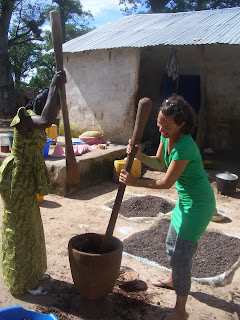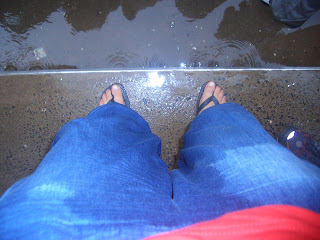The roof of the huts are made of dried grass and it is totally waterproof. There is no sound when it is raining, which is an advantage as the rain at home is nothing compared to the rain here!
The average number of children per woman is around 6, so each family has got several of these huts. Many people live in larger houses also. They call it a compound, and several houses are part of one compound. Many men has 2 or more wives (he can have as many as he can afford, I have seen up to 4, as number of wives is a measured in our questionnaire). The family consist of co-wives- (I don't think I ever will be comfortable with that word), plus in-laws and 6 children per women. Large families!

My fantastic crew eating breakfast! (Everyone is eating from the same pot, which is the procedure for every meal). Wherever you are when there is a meal you are invited to join. Most of the time they eat with their hands. I was at a hair dresser and there were no question, I had to eat with the workers. In this picture, Wesnic is to the left, a friend of Samba, Samba and our driver to the right. Wesnic and Samba are my research assistants and I really enjoy spending time with them!

My fantastic crew eating breakfast! (Everyone is eating from the same pot, which is the procedure for every meal). Wherever you are when there is a meal you are invited to join. Most of the time they eat with their hands. I was at a hair dresser and there were no question, I had to eat with the workers. In this picture, Wesnic is to the left, a friend of Samba, Samba and our driver to the right. Wesnic and Samba are my research assistants and I really enjoy spending time with them!
These small children were helping their mothers washing.
Seems like children here get heaps more responsibility than kids at home.. I wish I asked how old these girls are
We participated in some village work!
And this is ground nut (peanøtter), before polly gets their hands on them them. The fresh ones are really good if they are roasted a bit. Not fatty and salty as the ones we get home.
The road to the field. There are no signs, and one can hardly see the road. I have no idea how they end up in the right village. There is no electricity and seldom cars in the villages. Most of the time people use donkey cart to move around.
At the health clinic. Colorful women come with their newborns for vaccination and weighing.
Wesnic and I got to try out some cooking preparations. Though work!
Inside one of the huts. The tradition is that a woman can not leave her house the first week after giving birth. I was happy to I finally see how the huts looks like from the inside, and had tea with the women.
The boy is making a skipping rope (hoppetau). I joined the kids with the skipping rope that was a success. I had the best cheerleaders ever!
People are very relaxed here. (More about that later) The working day is supposed to be from 8-16, but the electricity comes on at 9, so the first hour seems to be for greeting each other and eat breakfast, if they turn up as early as eight. When we are going to the field, there are many things that need to happen before departure. Sometimes the driver sit around for a while before he starts washing the car. When the car is clean, he goes home to change clothes and maybe pick up some of the other workers. Then one of the others figure it is time for breakfast.. My patience and sense of effectiveness are being tested..!
Here are some of the phrases that people say to each other whenever they meet (this is in Mandinka, one of several languages). Trond-Olav, Binu, Pradeep and Maiken; if you know this when you come, you will make many people happy! (Thank you Marcus, I copied from your blog)
Salaam aaleekum - Maaleekum salaam (Peace be upon you - Peace be upon you also).
Kayira be - Kayira doron (Peace be upon you - Peace only).
Suumoolu lee? - I bee be jee (How are the compound people? - They are all fine).
Kori tana te jee - Tana te jee (Hope there is no evil - There is no evil).
I be naadii - N be jan doron (How are you - I'm fine).
Dookuwo be naadii - N be a kan doman doman (How is the work - I'm on it slowly slowly).
I have now ended training of the research assistants so they go out to the villages while I stay at home punching data, which is boring. I really miss the villages, I have had my best days there! But it feels good to pick up the questionnaires every evening and enter the data into the statistics program :)
























